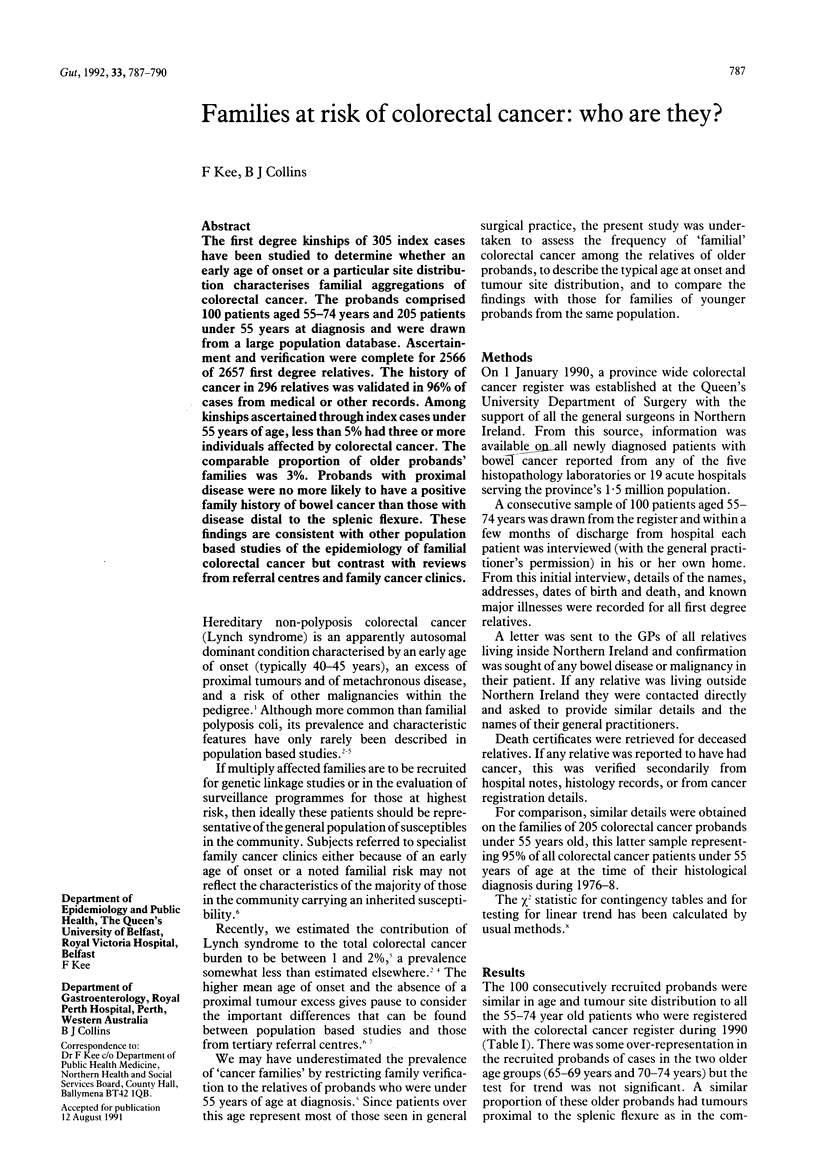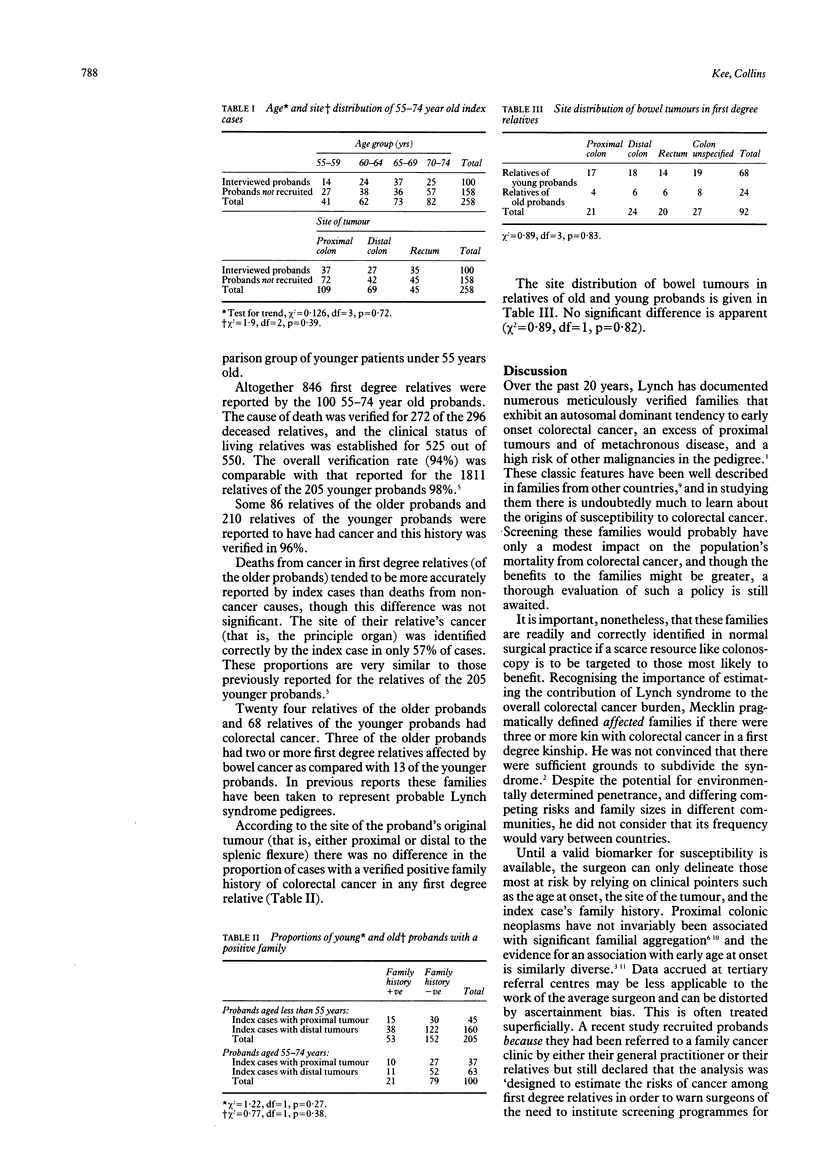Abstract
The first degree kinships of 305 index cases have been studied to determine whether an early age of onset or a particular site distribution characterizes familial aggregations of colorectal cancer. The probands comprised 100 patients aged 55-74 years and 205 patients under 55 years at diagnosis and were drawn from a large population database. Ascertainment and verification were complete for 2566 of 2657 first degree relatives. The history of cancer in 296 relatives was validated in 96% of cases from medical or other records. Among kinships ascertained through index cases under 55 years of age, less than 5% had three or more individuals affected by colorectal cancer. The comparable proportion of older probands' families was 3%. Probands with proximal disease were no more likely to have a positive family history of bowel cancer than those with disease distal to the splenic flexure. These findings are consistent with other population based studies of the epidemiology of familial colorectal cancer but contrast with reviews from referral centres and family cancer clinics.
Full text
PDF



Selected References
These references are in PubMed. This may not be the complete list of references from this article.
- Bailey-Wilson J. E., Elston R. C., Schuelke G. S., Kimberling W., Albano W., Lynch J. F., Lynch H. T. Segregation analysis of hereditary nonpolyposis colorectal cancer. Genet Epidemiol. 1986;3(1):27–38. doi: 10.1002/gepi.1370030104. [DOI] [PubMed] [Google Scholar]
- Cannon-Albright L. A., Thomas T. C., Bishop D. T., Skolnick M. H., Burt R. W. Characteristics of familial colon cancer in a large population data base. Cancer. 1989 Nov 1;64(9):1971–1975. doi: 10.1002/1097-0142(19891101)64:9<1971::aid-cncr2820640935>3.0.co;2-l. [DOI] [PubMed] [Google Scholar]
- Chidambaram A., Chakravarti A., Ferrell R. E., Iyengar S. Estimating the age-at-onset function using life-table methods. Genet Epidemiol. 1988;5(4):255–263. doi: 10.1002/gepi.1370050407. [DOI] [PubMed] [Google Scholar]
- Delendi M., Gardiman D., Riboli E., Sasco A. J. Latent colorectal cancer found at necropsy. Lancet. 1989 Jun 10;1(8650):1331–1332. doi: 10.1016/s0140-6736(89)92728-1. [DOI] [PubMed] [Google Scholar]
- Itoh H., Houlston R. S., Harocopos C., Slack J. Risk of cancer death in first-degree relatives of patients with hereditary non-polyposis cancer syndrome (Lynch type II): a study of 130 kindreds in the United Kingdom. Br J Surg. 1990 Dec;77(12):1367–1370. doi: 10.1002/bjs.1800771216. [DOI] [PubMed] [Google Scholar]
- Kee F., Collins B. J. How prevalent is cancer family syndrome? Gut. 1991 May;32(5):509–512. doi: 10.1136/gut.32.5.509. [DOI] [PMC free article] [PubMed] [Google Scholar]
- Kee F., Patterson C. C., Collins B. J., Boyd S. M., Sloan J. Histologic characteristics and outcome of familial non-polyposis colorectal carcinoma. Scand J Gastroenterol. 1991 Apr;26(4):419–424. doi: 10.3109/00365529108996504. [DOI] [PubMed] [Google Scholar]
- Lynch H. T., Schuelke G. S., Kimberling W. J., Albano W. A., Lynch J. F., Biscone K. A., Lipkin M. L., Deschner E. E., Mikol Y. B., Sandberg A. A. Hereditary nonpolyposis colorectal cancer (Lynch syndromes I and II). II. Biomarker studies. Cancer. 1985 Aug 15;56(4):939–951. doi: 10.1002/1097-0142(19850815)56:4<939::aid-cncr2820560440>3.0.co;2-t. [DOI] [PubMed] [Google Scholar]
- Lynch H. T., Watson P., Kriegler M., Lynch J. F., Lanspa S. J., Marcus J., Smyrk T., Fitzgibbons R. J., Jr, Cristofaro G. Differential diagnosis of hereditary nonpolyposis colorectal cancer (Lynch syndrome I and Lynch syndrome II). Dis Colon Rectum. 1988 May;31(5):372–377. doi: 10.1007/BF02564888. [DOI] [PubMed] [Google Scholar]
- Mecklin J. P. Frequency of hereditary colorectal carcinoma. Gastroenterology. 1987 Nov;93(5):1021–1025. doi: 10.1016/0016-5085(87)90565-8. [DOI] [PubMed] [Google Scholar]
- Ponz de Leon M., Sassatelli R., Sacchetti C., Zanghieri G., Scalmati A., Roncucci L. Familial aggregation of tumors in the three-year experience of a population-based colorectal cancer registry. Cancer Res. 1989 Aug 1;49(15):4344–4348. [PubMed] [Google Scholar]
- Sams J. S., Lynch H. T., Burt R. W., Lanspa S. J., Boland C. R. Abnormalities of lectin histochemistry in familial polyposis coli and hereditary nonpolyposis colorectal cancer. Cancer. 1990 Aug 1;66(3):502–508. doi: 10.1002/1097-0142(19900801)66:3<502::aid-cncr2820660317>3.0.co;2-n. [DOI] [PubMed] [Google Scholar]
- Sarroca C., Quadrelli R., Praderi R. Cancer colique familial. Nouv Presse Med. 1978 Apr 22;7(16):1412–1412. [PubMed] [Google Scholar]
- Schneider N. R., Chaganti S. R., German J., Chaganti R. S. Familial predisposition to cancer and age at onset of disease in randomly selected cancer patients. Am J Hum Genet. 1983 May;35(3):454–467. [PMC free article] [PubMed] [Google Scholar]
- Schulte P. A. Methodologic issues in the use of biologic markers in epidemiologic research. Am J Epidemiol. 1987 Dec;126(6):1006–1016. doi: 10.1093/oxfordjournals.aje.a114740. [DOI] [PubMed] [Google Scholar]
- Søndergaard J. O., Bülow S., Lynge E. Cancer incidence among parents of patients with colorectal cancer. Int J Cancer. 1991 Jan 21;47(2):202–206. doi: 10.1002/ijc.2910470207. [DOI] [PubMed] [Google Scholar]


